|
TIN
VĂN
Nguyễn Quốc Trụ
Viết Mỗi Ngày
VIẾT
MỖI NGÀY / MAY 01, 2018

Liệu bạn có thể tưởng tượng cuốn sách khổng lồ, là
Bách Khoa Toàn Thư Tin Văn Toàn Tập, và cuộc gặp gỡ trên, là giữa GCC
và… độc giả TV, trong 1 buổi ra mắt sách ở Tiểu Sài G̣n?
Yes, sure, why not?
Re: Editing and publishing...
Today at 4:54 PM
It's exactly right! Why not? Hooray...
Happy New Year, Gau Nha Van.
H/A
Tks
Take Care
The Moon
for Maria Kodama
There is such loneliness in that gold.
The moon of the nights is not the moon
Whom the first Adam saw. The long centuries
Of human vigil have filled her
With ancient lament. Look at her. She is your mirror.
-W.B.
J.L. Borges
Trăng
Có cái cô đơn khủng khiếp như thế đó ở trong mảnh trăng vàng.
Trăng của đêm không phải trăng Adam đầu tiên nh́n thấy
Những thế kỷ dài của những lời khẩn cầu của con người
Đă tẩm vào nàng lời than van xưa, cũ.
Hăy nh́n nàng ḱa.
Nàng là tấm gương của em đó.
Bài thơ trên, trong “Borges Tám Bó”, ông có đi 1 đường c̣m thần
sầu.
Post ở đây, và sẽ tŕnh tiếp bản tiếng Mít, và nhân
đó, lèm bèm về dịch thuật, nhân đọc 1 bài viết trên FB, của Sến Cô Nương
về đề tài này.
Hồi học Nguyễn Trăi, Hà Nội, ông thầy dậy tiếng Anh
của Gấu, tên là Xuân. Một bữa, có 1 anh trong lớp, vẽ 1 bức hư hoạ lên
bảng, và ghi chú là Mr. Spring. Thầy bực quá, phạt, anh học tṛ bèn,
thưa Thầy, Spring đâu phải tên Thầy. Thầy cười, tha, và nói, đúng rồi,
tên ta là Xuân, không phải Spring!
Cũng theo nghĩa đó, “bread” không phải là “bánh ḿ”!
Nhưng phải là Borges, mới nh́n thấu được tới cơi
trời, khi phán, chính thơ, và hồi ức, và quên lăng, đem giầu có đến cho
từ, that poetry, that memory, that oblivion have enriched the word.
VP từng phán, thơ không dịch được. Dịch chỉ c̣n
xương, thịt mất hết. Borges cũng tin như thế, nhưng ông nói thêm, nếu
không dịch th́ phịa ra nó, nghĩa là, sáng tạo ra nó. Một bài thơ dịch,
dù là dịch sai, dịch chưa tới, cũng là 1 đời sống khác, của nguyên tác.
LA LUNA
a Maria Kodama
Hay tanta soledad en ese
oro.
La luna de las noches no es la luna
Que vio el primer Adán. Los largos siglos
De la vigilia humana la han
colmado
De antiguo Ilanto. Mirala. Es tu espejo.
Perhaps we are allowed to ask a few words. I think that poetry, that
memory, that oblivion have enriched the word. I wonder if the word
moon, that lingering English word, is precisely the same as the
Latin or Spanish luna. I suppose they are slightly different, and
that slight difference may be all important, for all we know. But in
this case I thought of generations of men looking long and long at the
moon and thinking of it and changing it into myths, for example, the
myth of Endymion on Latmos. And then I thought to myself: When I look at
the moon I'm not looking simply at a luminous volume in the sky. I'm
also looking at the moon of Virgil, of Shakespeare, of Verlaine, of
Góngora. And so I wrote that poem. I think the first line should not be
forgotten—Hay tanta soledad en ese oro "There is such loneliness
in that gold"—since without it the poem might fall to pieces—perhaps it
has. For after all, writing poetry is a very mysterious thing. The poet
should not tamper with what he writes, he should not intrude himself
into his writing. Let the writing do itself. Let the Holy Ghost or the
muse or the subconscious —to give it an ugly contemporary name—have its
way and then perhaps we make up poetry. Even I may write a poem.

art2all.net |

